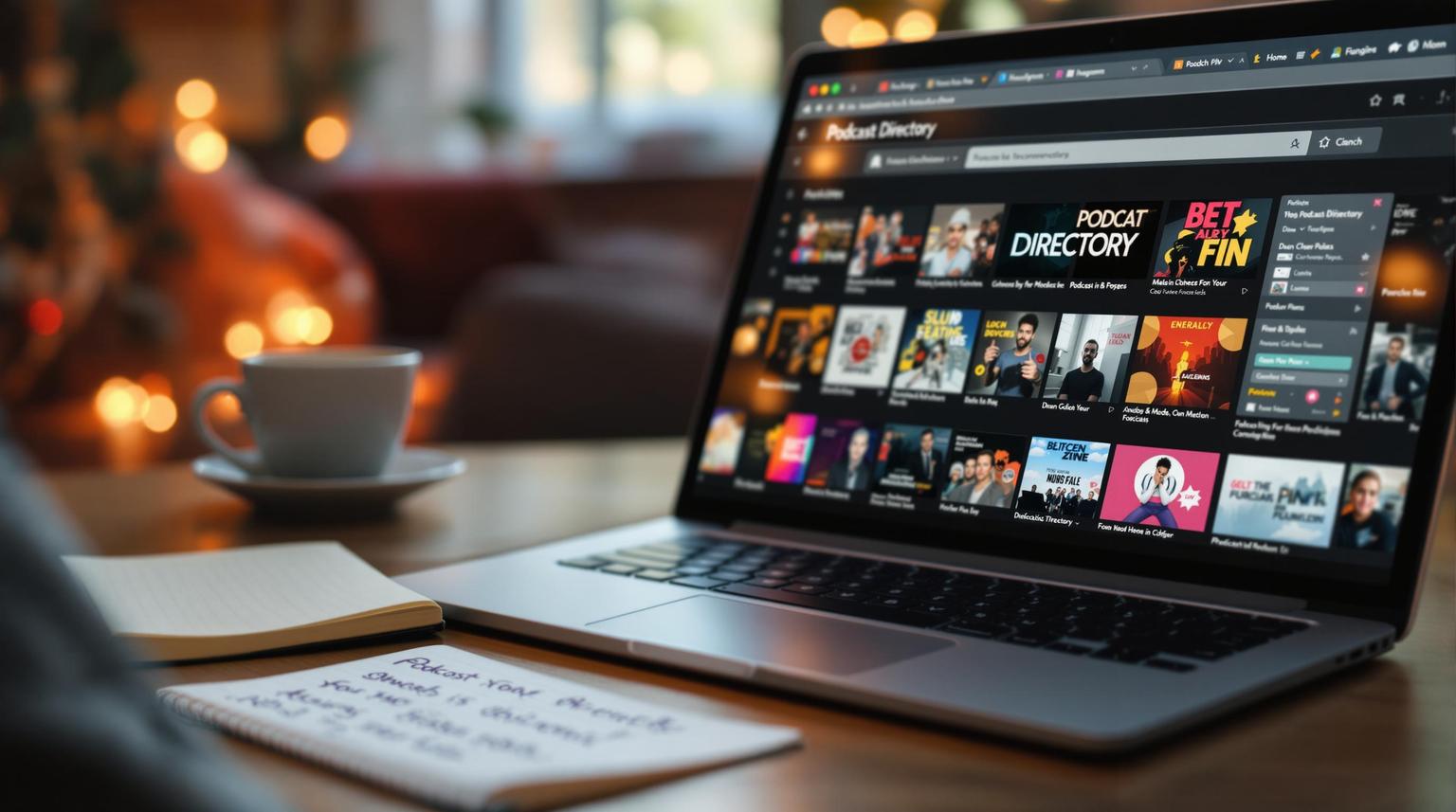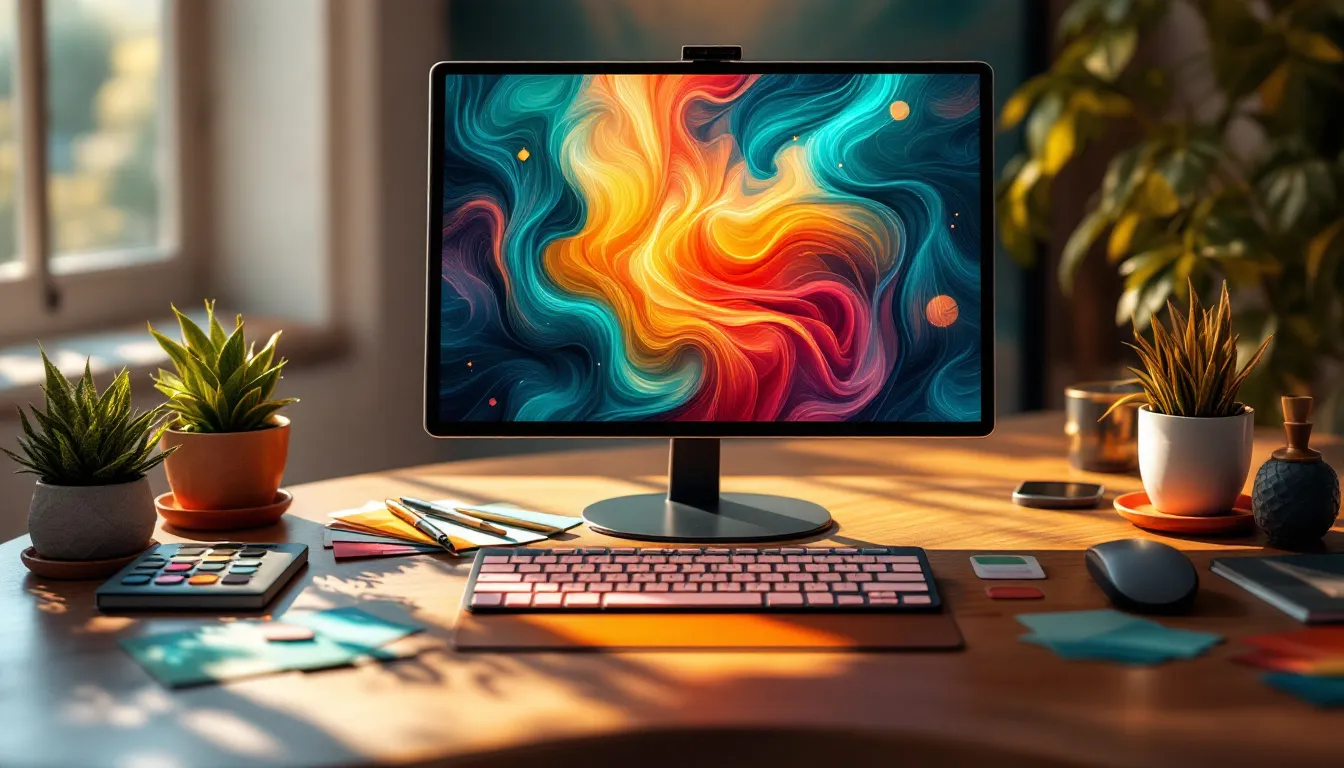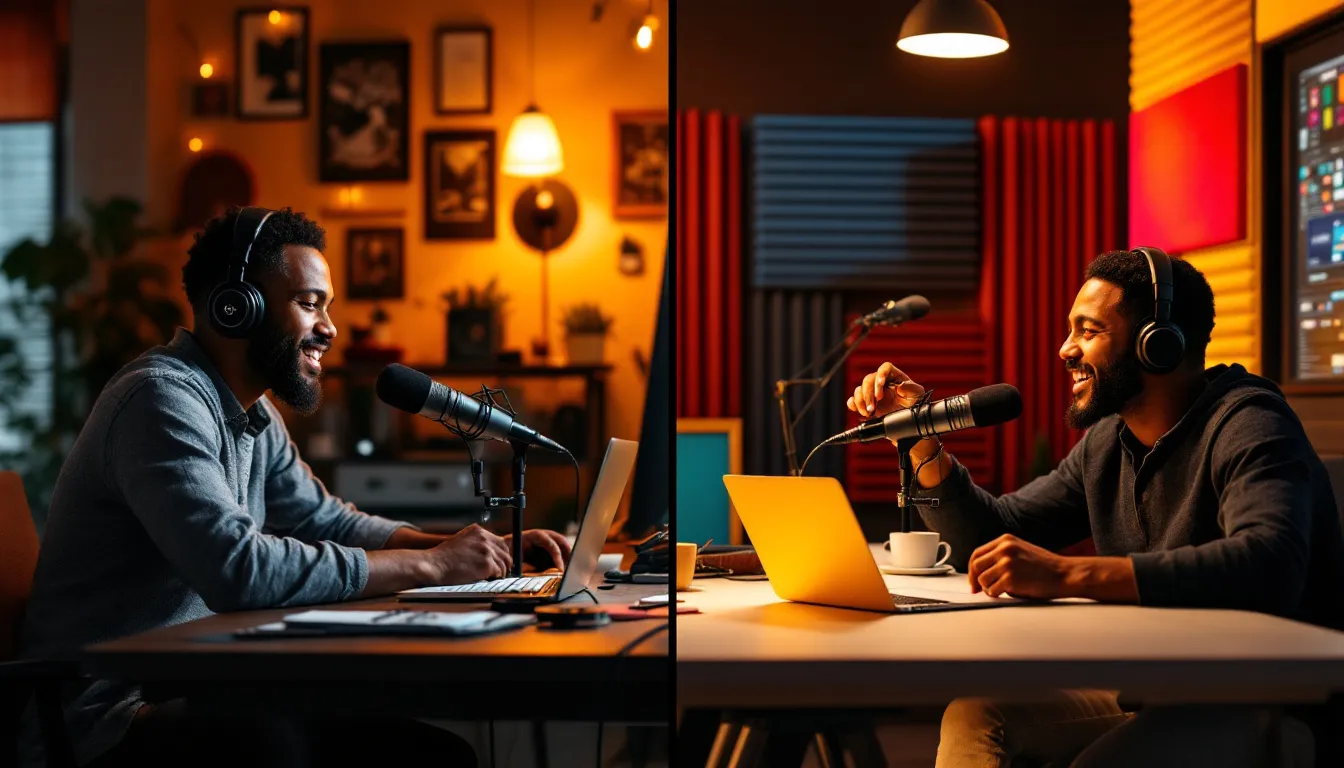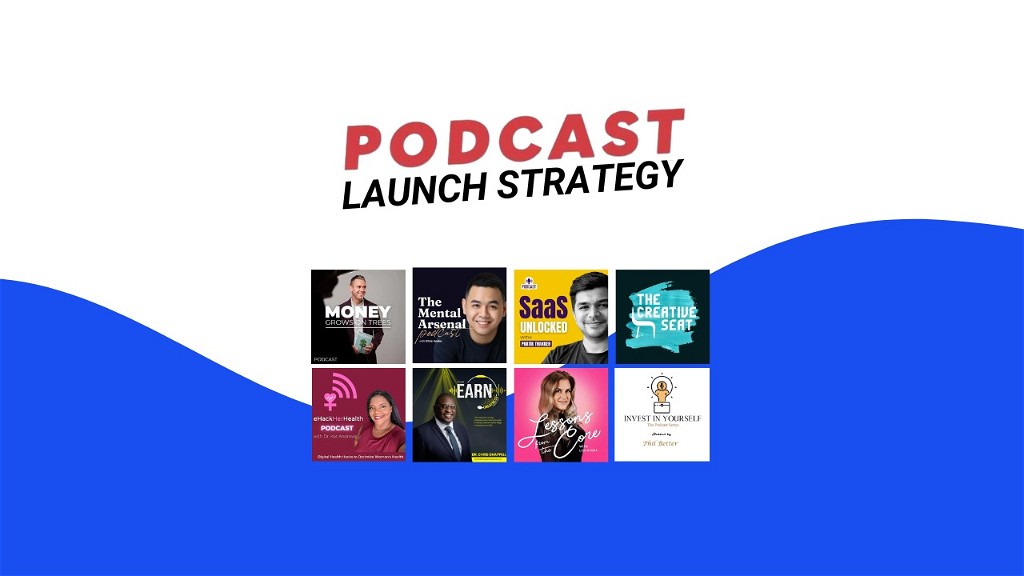Looking for the best podcasting tools to edit and produce your show? Here's a quick rundown of the top options:
- Adobe Audition - Pro-level editing with advanced features
- Audacity - Free, open-source editor for basic to intermediate needs
- GarageBand - Free, user-friendly option for Mac users
- Hindenburg Journalist - Purpose-built for podcasters and radio
- Descript - Text-based editing with AI features
- Reaper - Powerful and affordable digital audio workstation
- Auphonic - Automated audio post-production
- Alitu - Easy-to-use, automated podcast production
- Pro Tools - Industry-standard for professional audio production
Quick Comparison:
| Tool | Best For | Key Features | Price |
|---|---|---|---|
| Adobe Audition | Pros | Advanced editing, templates | $20.99/month |
| Audacity | Beginners | Multi-track, noise reduction | Free |
| GarageBand | Mac users | Virtual instruments, loops | Free |
| Descript | All-in-one | AI mixer, transcriptions | Free - $30/month |
| Alitu | Newbies | Automated editing, easy interface | $32/month |
Choose based on your skill level, podcast format, and budget. Most paid options offer free trials, so test them out to find the best fit for your needs.
Related video from YouTube
How to Choose Podcasting Tools
Picking the right podcasting tools can make or break your show. Here's what to consider:
1. Ease of use
If you're new to podcasting, go for user-friendly software. Alitu, for example, has a simple interface and automation features that make editing easy.
2. Features
Think about what you need. Basic editing? Sound effects? Multi-track recording? Adobe Audition has advanced features, but it might be too much if you just need simple edits.
3. System compatibility
Make sure the software works with your computer. GarageBand is Mac-only. Audacity runs on Windows, Mac, and Linux.
4. Cost
Your budget matters. Here's a quick comparison:
| Software | Price |
|---|---|
| Audacity | Free |
| Alitu | $38/month |
| Adobe Audition | $20.99/month |
5. User reviews
See what other podcasters say. Check forums and social media for real-world feedback.
The best tool? It's the one you'll actually use. If you're just starting, don't get stuck with complex software.
"The most important thing is to just start. You can always upgrade your tools later." - Pat Flynn, founder of Smart Passive Income
On a tight budget? Start with free options like Audacity. As you grow, explore paid tools with more features. Find a balance between your needs, skills, and budget.
Adobe Audition
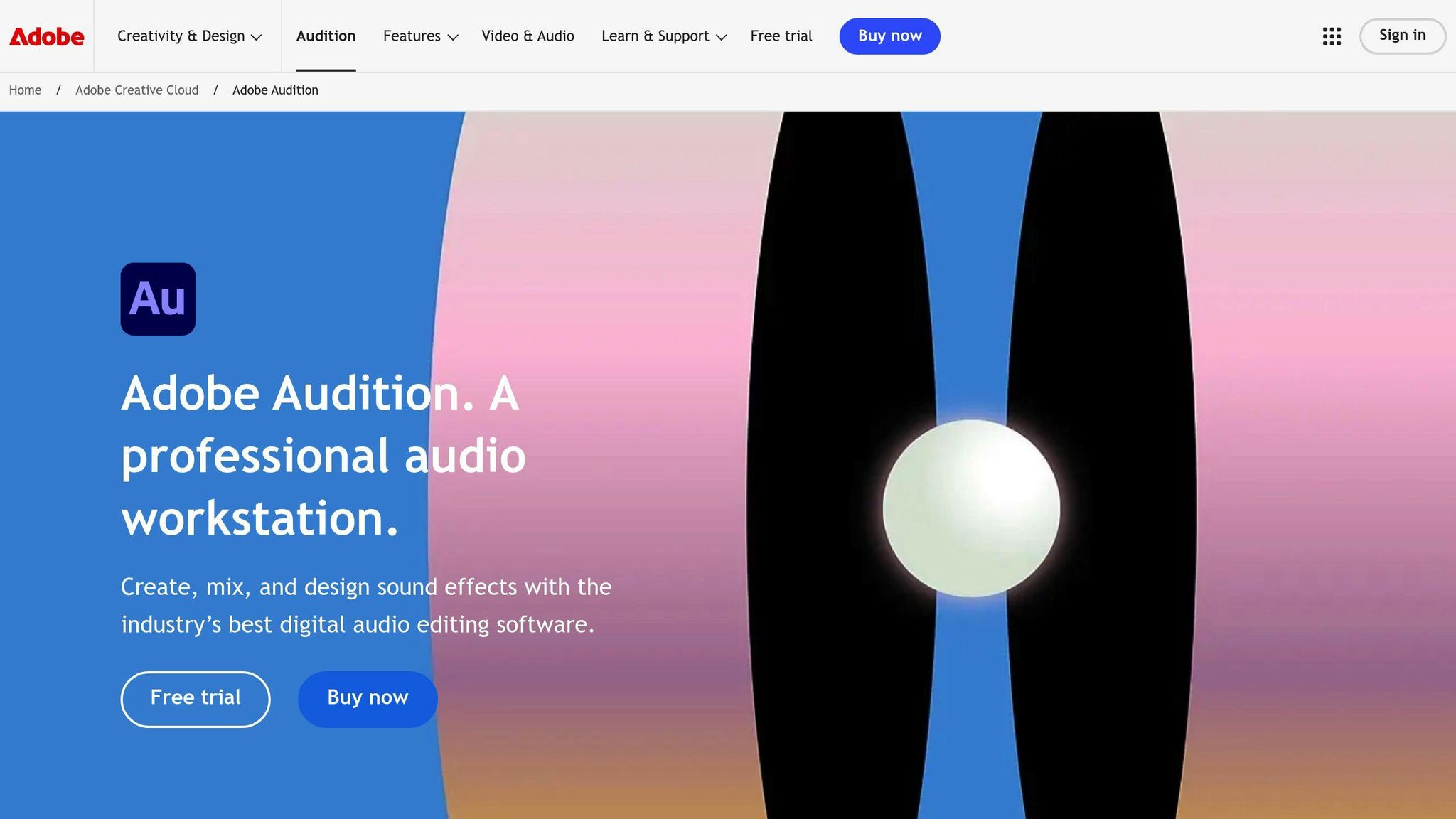
Adobe Audition is a powerhouse for podcast audio editing. It's packed with features that'll make your show sound pro-level. But it's not for everyone. Let's break it down.
What Can It Do?
Audition lets you record, edit, and mix like a pro. You can:
- Split and rearrange audio clips
- See your sound with spectral analysis
- Zap background noise
- Add filters and effects
- Create surround sound
Want to kill that annoying hum? Here's how:
- Pick your audio file
- Hit "Window" > "Essential Sound"
- Click "Reduce Noise"
Easy, right?
For Big Productions
Got a complex show? Audition's got you covered:
- Handle up to 128 tracks
- Record 32 inputs at once
- Play nice with other Adobe apps
- Work with tons of file types
Plus, it meets broadcast standards. Your podcast will sound top-notch.
Who's It For?
Audition is best for:
- Serious podcasters
- Audio pros
- Music makers
It's not beginner-friendly. But stick with it, and you'll be editing faster than you can say "subscribe and review."
What'll It Cost You?
| Plan | Price |
|---|---|
| Monthly | $31.49 |
| Annual (monthly payments) | $20.99 |
| Creative Cloud (20+ apps) | $59.99/month |
| Student/Teacher (first year) | $19.99/month |
You can try it free for 14 days. Just have your credit card ready.
"Adobe Audition is going to be the closest you get to professional sounding quality with this sort of software." - ForCreators.com
Is it pricey? Yeah. But for pro-level editing and Adobe integration, many podcasters think it's worth every penny.
2. Audacity
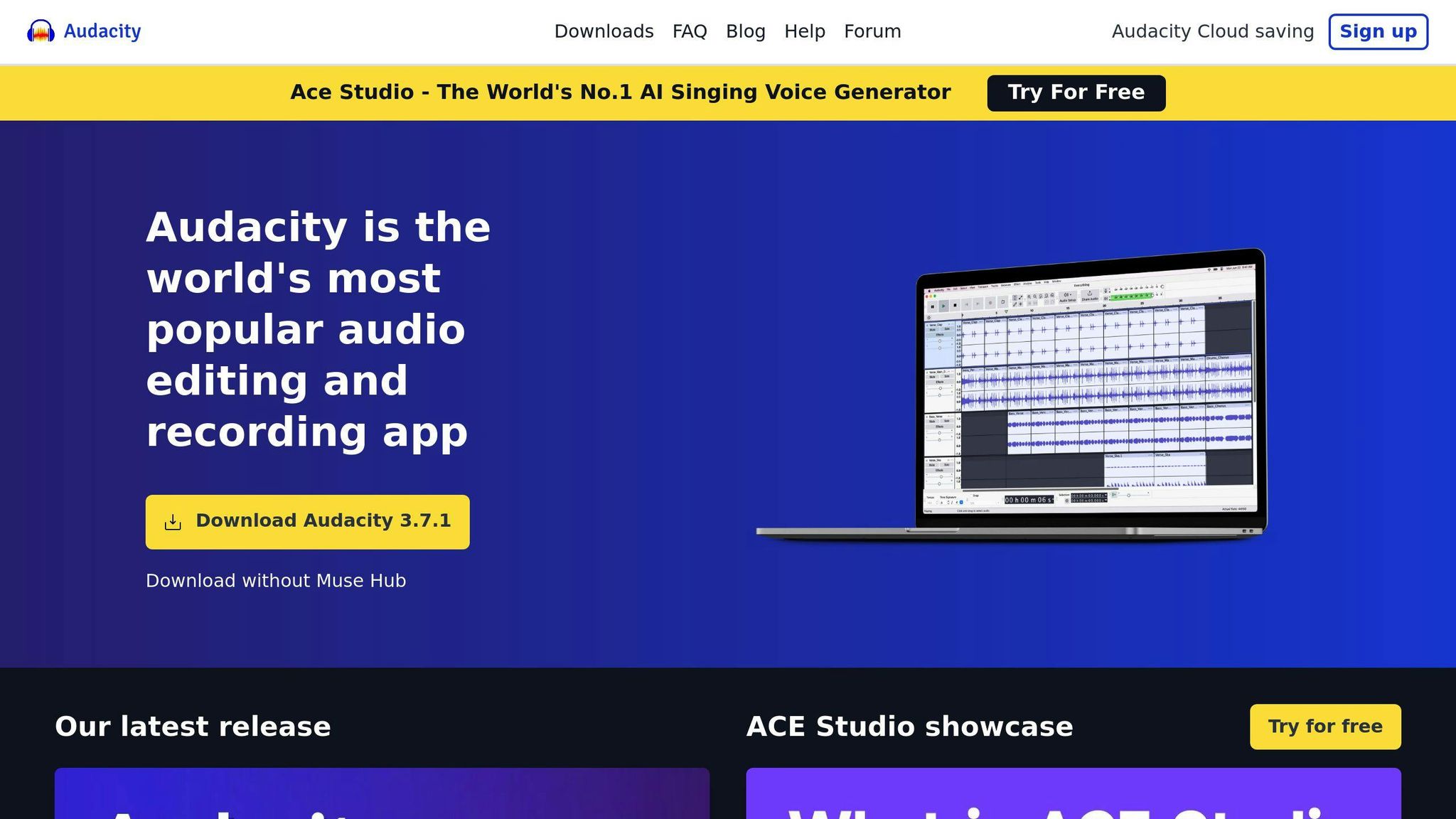
Audacity is a free, open-source audio editor that packs a punch for podcast production. Let's dive into what it offers:
Audio Editing Features
Audacity gives you the tools to polish your podcast:
- Cut, copy, and paste audio segments
- Zap background noise
- Boost quiet parts and balance volume
- Tweak frequencies for clearer sound
Want to nix that annoying hum? Here's how:
- Find a spot with just the noise
- Hit "Effect > Noise Reduction"
- Click "Get Noise Profile"
- Select your whole track
- Apply the effect
Production Capabilities
Audacity isn't just for trimming. You can:
- Work with multiple tracks
- Import various audio formats
- Record live or from your computer
- Add effects like compression
- Export as MP3, OGG, and more
Pro tip: Use compression for consistent volume. Select your track, go to "Effect > Compressor", and set the Threshold between -10dB and -16dB.
Who It's For
Audacity works great for:
- Newbies on a budget
- Pros who like to keep it simple
- Windows, Mac, and Linux users
It's not the easiest to use, but many find it worth the learning curve. Plus, there's tons of help online if you get stuck.
Pricing
| Plan | Price |
|---|---|
| Full Version | $0 |
| Updates | $0 |
| Support | Community |
Yep, it's all free. But keep in mind:
- No built-in sound library
- Can't record remotely
- No AI magic - you'll need to edit manually
"Audacity has a wide variety of controls and capabilities for editing, making it a very robust tool for audio editing." - Verified User
If you're willing to learn, Audacity gives you pro-level editing without the price tag. It's not fancy, but it gets the job done.
3. GarageBand
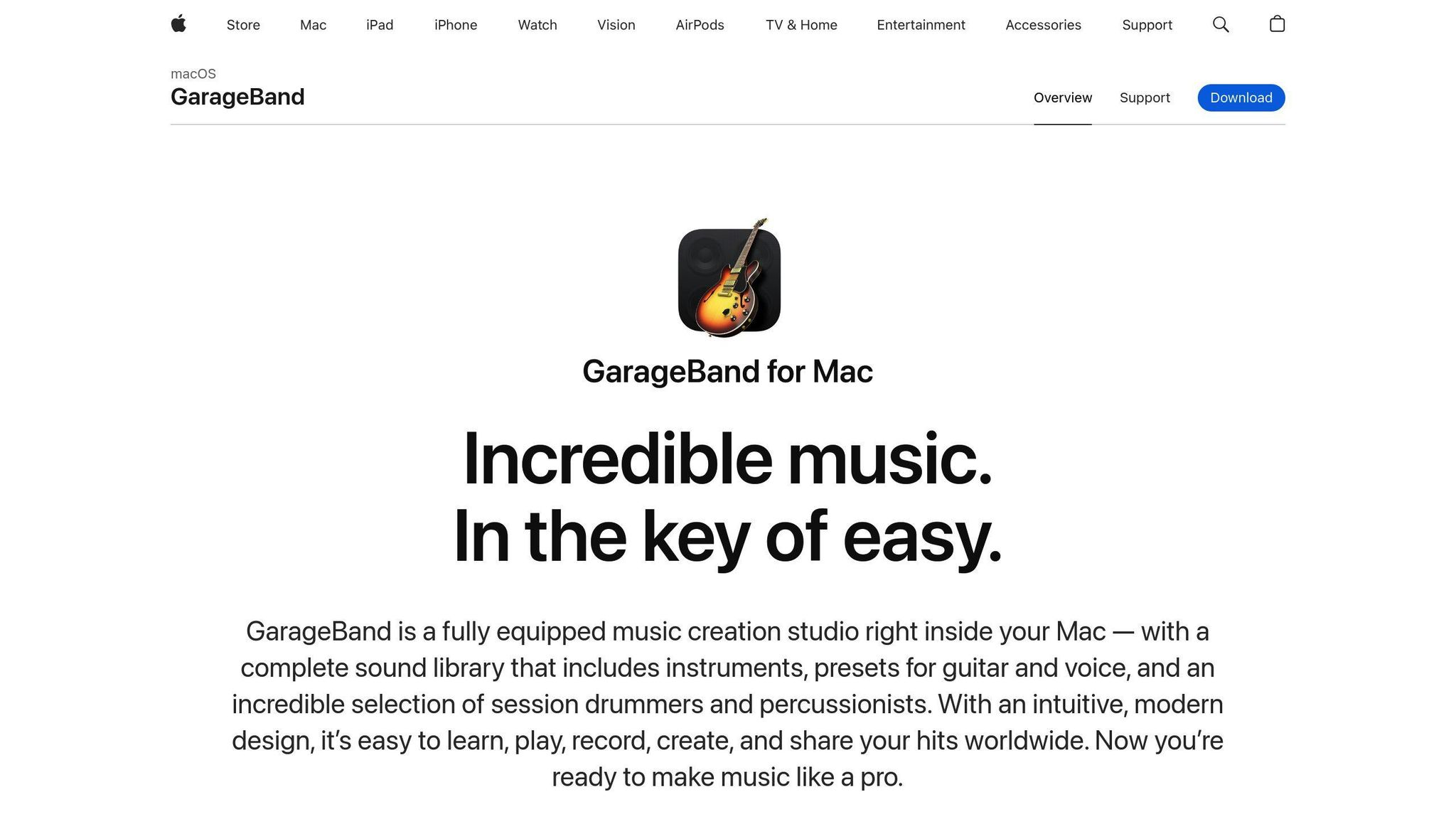
GarageBand is Apple's free audio editing software. It's packed with features for podcast editing and production. Let's dive in.
Audio Editing Features
GarageBand's got some nifty tools:
- Loop Pointer for precise trimming
- Split Regions at Playhead to divide tracks
- Automation for smooth volume adjustments
To start, plug in your mic and create a new project. Choose single or multitrack recording - whatever fits your podcast style.
Production Capabilities
GarageBand comes loaded with:
- Apple loops and sound effects
- EQ, Noise Gate, and Compression tools
- Drag-and-drop for easy audio tweaking
"GarageBand is an excellent and underrated DAW, especially since it's free for all Mac users. It's a pretty easy editor to start using right away, with a ton of resources online to help you use more advanced features." - Danny, Podcaster & Head of Customer Experience at Captivate
Quick tip: Turn off the metronome and count-in before recording. Trust me, you don't want those in your podcast.
Who's It For?
GarageBand is perfect if you're:
- New to podcasting
- Using Mac, iPhone, or iPad
- Looking for a free, easy-to-use platform
If you're familiar with Apple products, you'll pick it up fast.
Pricing
| Plan | Price |
|---|---|
| Full Version | Free |
| Updates | Free |
| Availability | Pre-installed on Apple devices |
Can't beat free, right? It's a top choice for budget-conscious podcasters.
One downside: GarageBand doesn't directly integrate with podcast hosts. You'll need to export your project and upload it manually. But for a free tool, that's a small price to pay.
4. Hindenburg Journalist
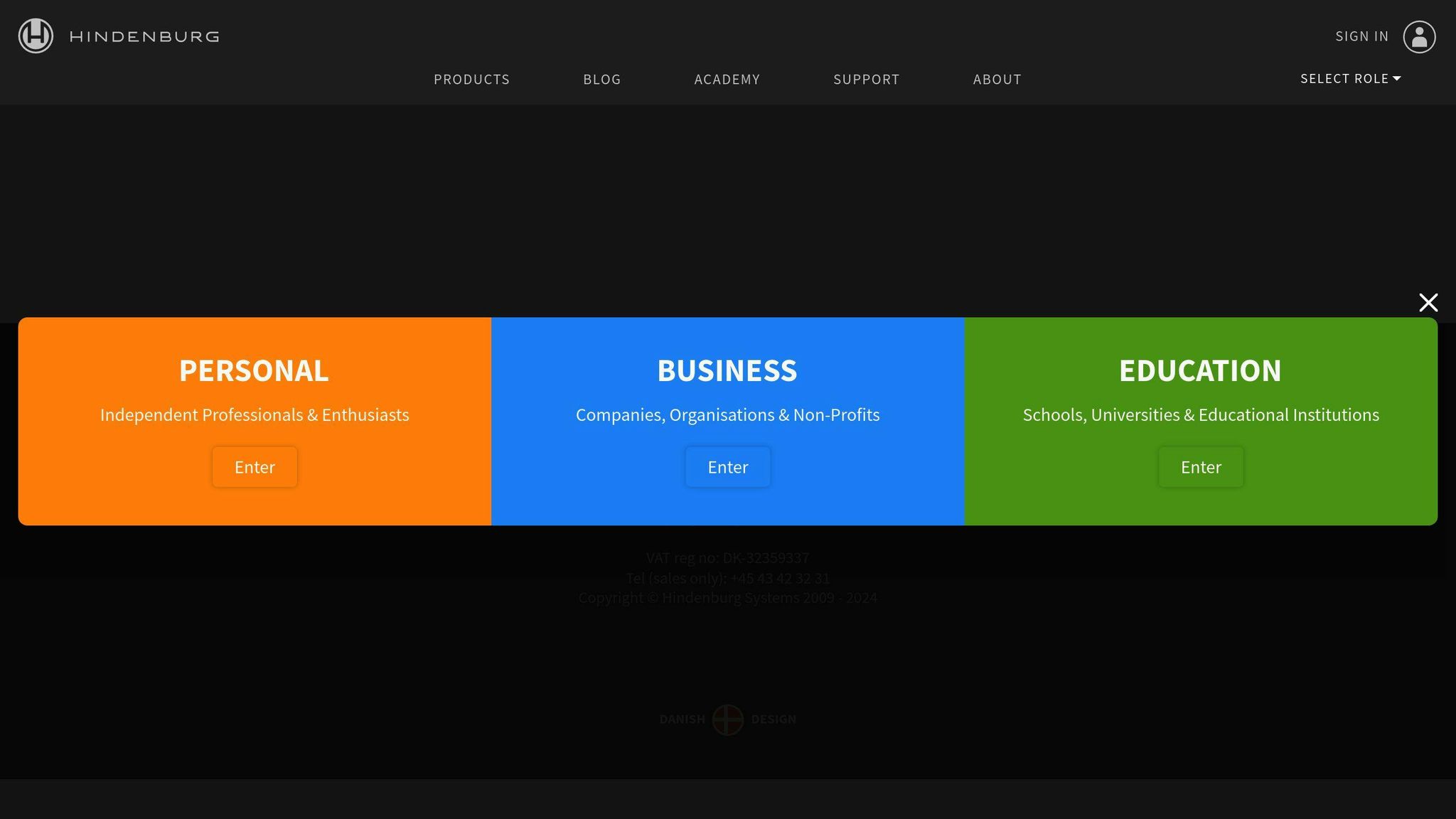
Hindenburg Journalist is a DAW built for podcasters. It's like a Swiss Army knife for audio storytelling.
What's in the Box?
- Multi-track recording and editing
- Auto-leveler (no more volume rollercoasters)
- Voice profiler (EQ magic)
- Clipboard for clip organization
You can record directly or import audio. The interface? It's all about storytelling, not tech headaches.
Production Power
Hindenburg's got some tricks up its sleeve:
- Built-in effects (EQ, Compressor, Noise Reduction)
- Auto audio analysis and balancing
- Direct publishing to Buzzsprout
Here's a cool bit: One-click multi-format production. It's like having a time machine for post-production.
Who's It For?
- Podcasters (newbies to pros)
- Radio journalists
- Audiobook creators
No PhD in audio engineering required. It's user-friendly stuff.
What'll It Cost You?
| Version | Price | What You Get |
|---|---|---|
| Journalist | $95 (one-time) | Basic editing, auto-leveler |
| Journalist Pro | $375 (one-time) | Advanced features, multi-track recording |
| PRO Subscription | $99/year or $12/month | All the bells and whistles, regular updates |
Want to try before you buy? There's a 30-day free trial.
"Hindenburg gives me exactly what I need and not all the extra stuff I don't. It's a huge time saver." - Jennifer Navarrete, Crypto Content Creators
Bottom line? Hindenburg Journalist is laser-focused on spoken word. It's the go-to for podcasters who want to edit fast and skip the tech maze.
5. Descript
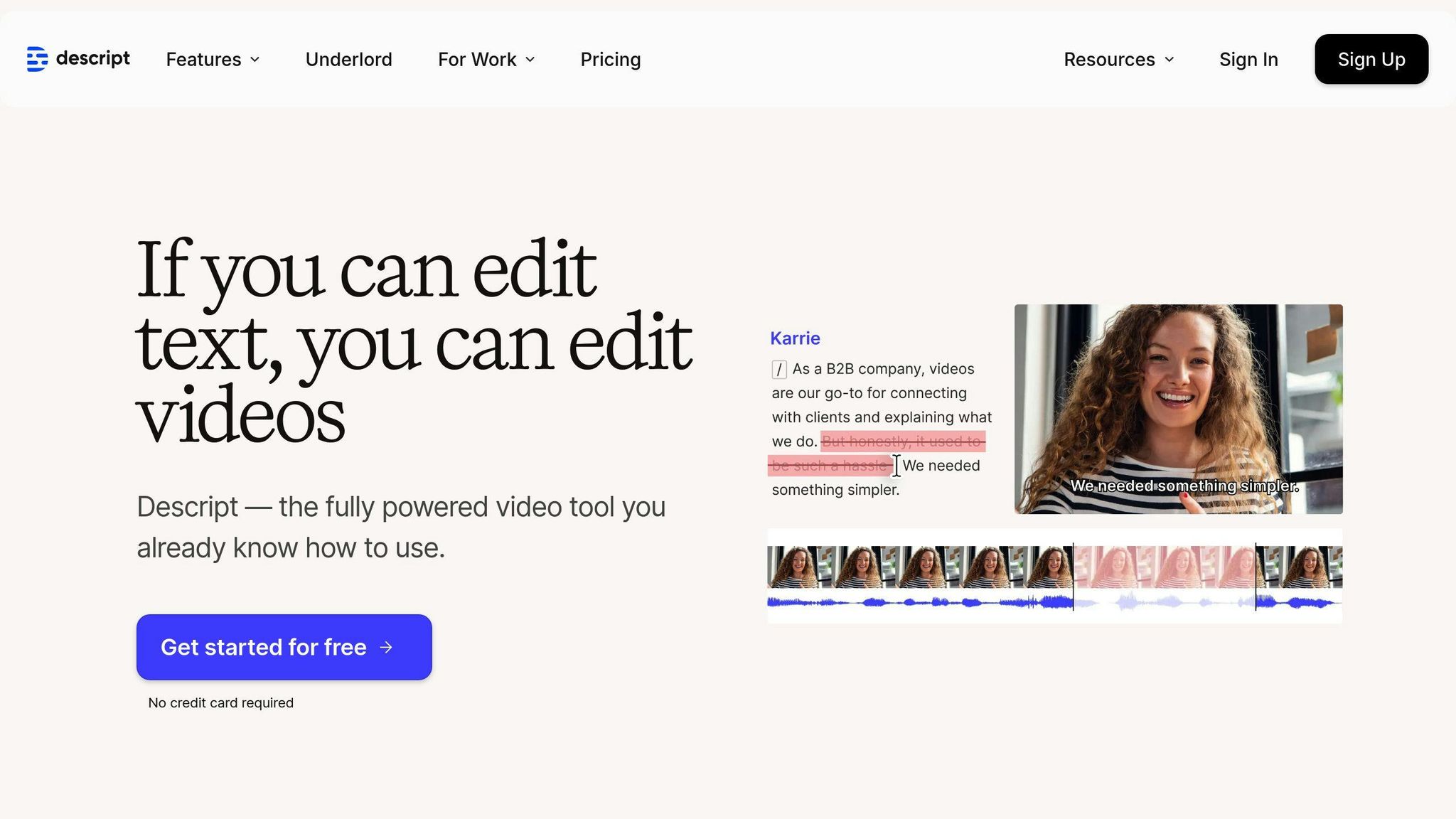
Descript turns audio editing into a text-based process. Upload your podcast, it transcribes it, and you edit the text to edit the audio. Simple as that.
Key Features
- Edit audio by editing text
- Zap filler words
- Record and edit multiple tracks
- Auto-transcription
- Studio Sound: Bye-bye echo and background noise
- Overdub: Your voice, in text-to-speech
- Screen recording: Capture video with your audio
- Publish directly to podcast platforms
Who's It For?
Descript's for new podcasters, seasoned hosts, small business owners, and anyone wanting an all-in-one podcast solution.
Pricing
| Plan | Monthly Price | What You Get |
|---|---|---|
| Free | $0 | 1hr transcription, 720p export (watermarked) |
| Creator | $15 | 10hrs transcription, 4K export, 1,000-word Overdub |
| Pro | $30 | 30hrs transcription, unlimited Overdub, 1TB storage |
Paid plans? Unlimited watermark-free exports.
"Descript makes it super easy to edit an audio or video file. I use it for my podcast, and the ability to use a Word editor to correct errors, etc., is genius." - Danny B, Podcaster Success Analyst
Descript's text-based editing? It's different. It's for podcasters who want to focus on content, not tech details.
6. Reaper
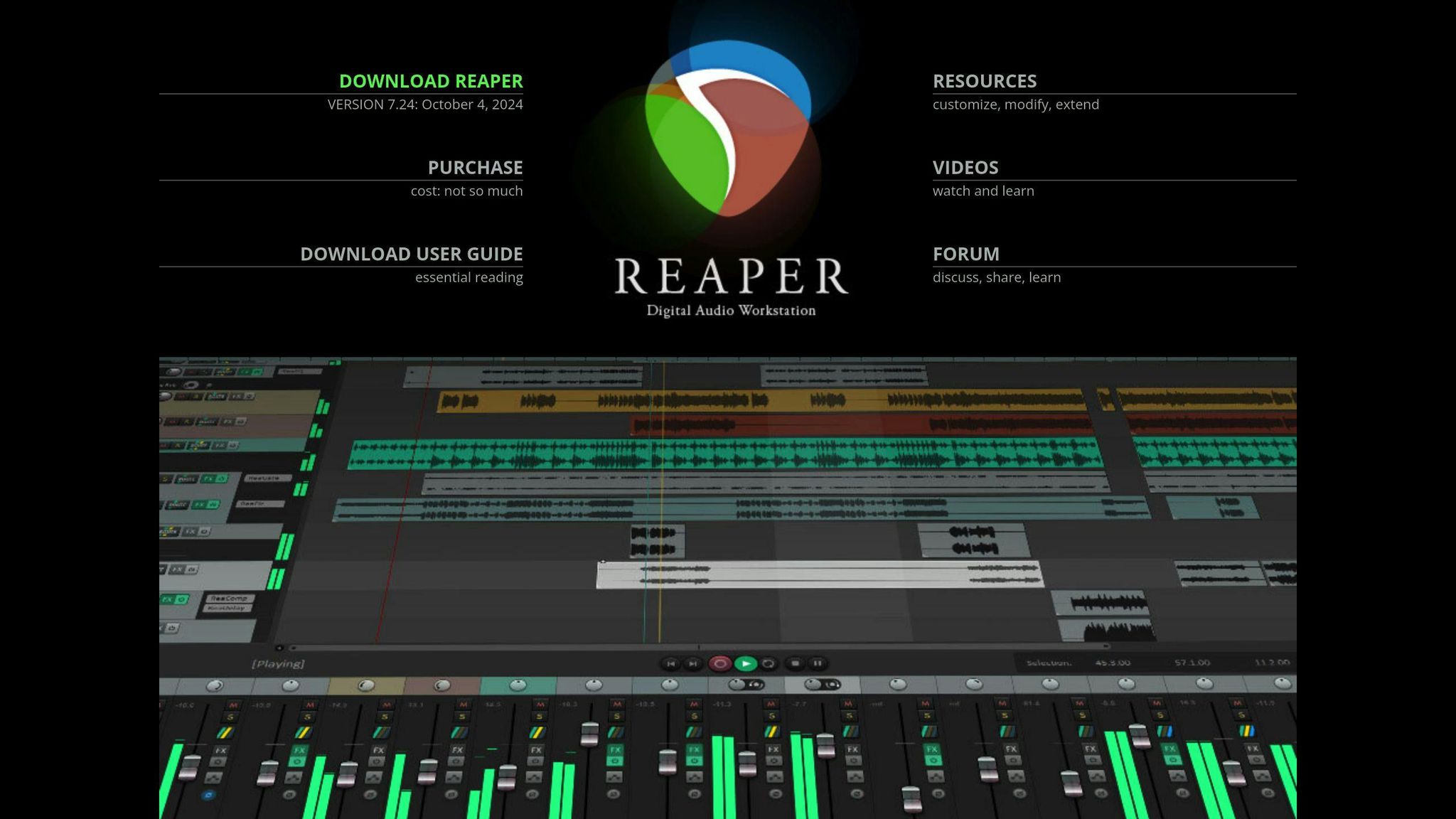
Reaper is a powerhouse DAW that's caught the eye of many podcasters. Here's why:
Audio Editing Features
Reaper's editing toolkit is no joke:
- Non-destructive editing
- Multi-format support
- Dynamic split for easy mistake removal
- Spectral peak coloring
- Customizable keyboard shortcuts
Production Capabilities
But Reaper isn't just about editing. It's a full-on production beast:
- Multiple track support
- Built-in plugins
- Third-party plugin compatibility
- ReaScript for custom functions
User Suitability
Reaper's got something for everyone:
- Beginners can start simple
- Pros can dive deep
- Budget-conscious creators get pro-grade tools without breaking the bank
"It looks complicated, but will be as simple as you need it to be." - Courtney Carthy, Author
Pricing Plans
Reaper keeps it simple:
| License Type | Price | Best For |
|---|---|---|
| Discounted | $60 | Personal use, small businesses |
| Commercial | $225 | Professional studios, larger organizations |
Both are one-time payments with free updates. Talk about bang for your buck!
Reaper's mix of power, flexibility, and affordability makes it a top pick for podcast production. Sure, the learning curve might be a bit steeper, but for many podcasters, the payoff is worth it.
sbb-itb-cdb7710
7. Auphonic
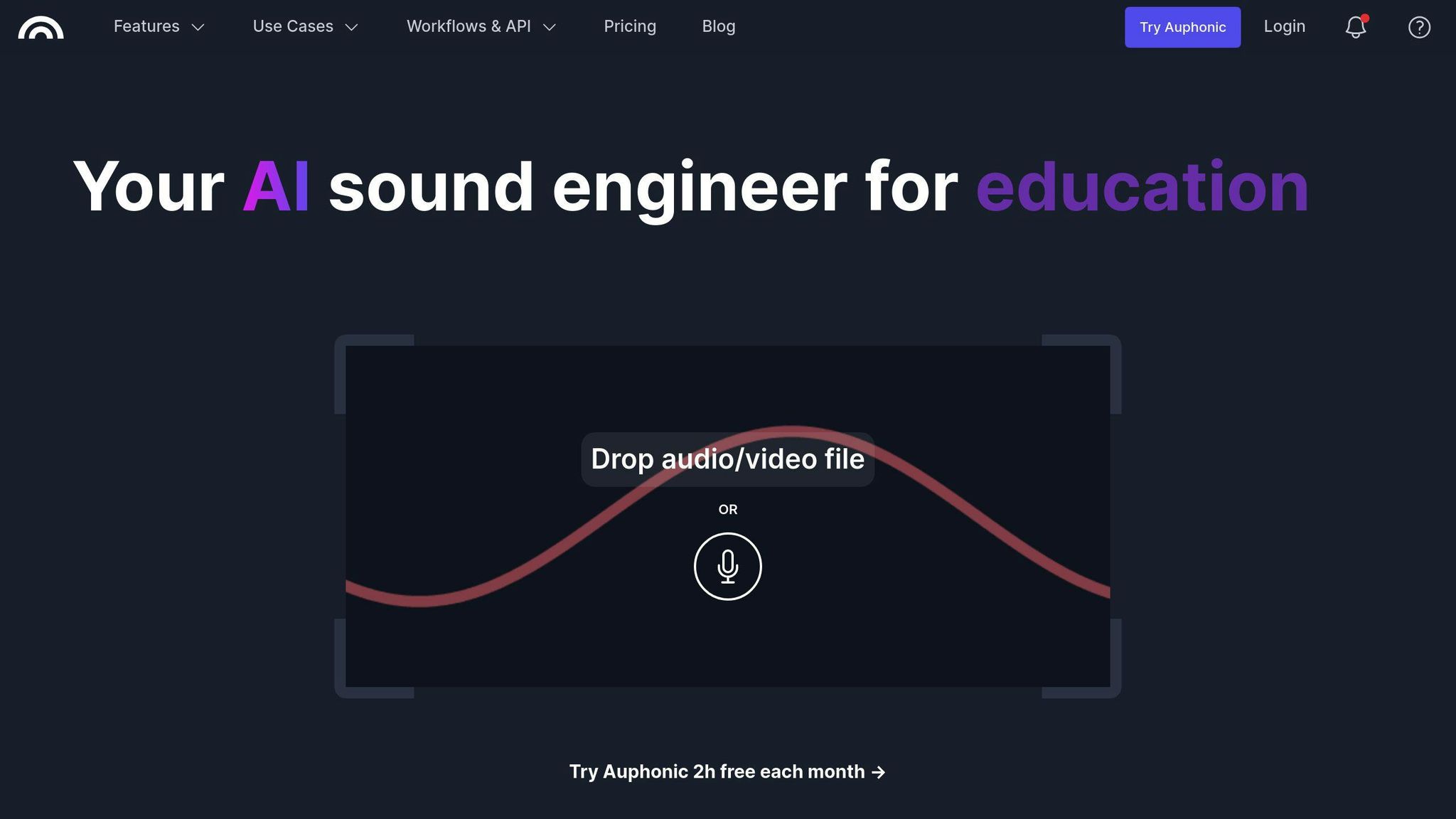
Auphonic is a smart audio tool that makes your podcast sound better. It's easy to use, even if you're not a tech whiz.
What Can Auphonic Do?
Auphonic has some cool tricks up its sleeve:
- Levels out your audio
- Makes your podcast the right loudness
- Cuts down on background noise
- Cleans up your sound
These features work together to make your podcast sound pro.
More Than Just Editing
Auphonic does extra stuff too:
- Adds intros and outros automatically
- Puts in chapter markers
- Creates basic transcripts
- Adds ID3 tags for better SEO
One neat feature? You can export multiple tracks. This means you can control things like music volume when you're talking.
"I can make the music quieter when I'm speaking, then bring it back up when I'm not." - Mike, Podcast Creator
Who's It For?
Auphonic works for all kinds of podcasters:
- Newbies: It's easy to use
- Pros: It has advanced features
- Busy folks: You can process multiple files at once
How Much Does It Cost?
Auphonic has different plans:
| Plan | Price | What You Get |
|---|---|---|
| Free | $0 | 2 hours/month |
| Yearly | $11/month | 9 hours/month |
| Pay-as-you-go | $12/month | Use when you need it |
The free plan is great to start. Paid plans give you more time as your podcast grows.
Pro tip: For the best sound, export your files as WAV 16-bit PCM. Then convert to MP3 at 192 kbps for hosting.
8. Alitu
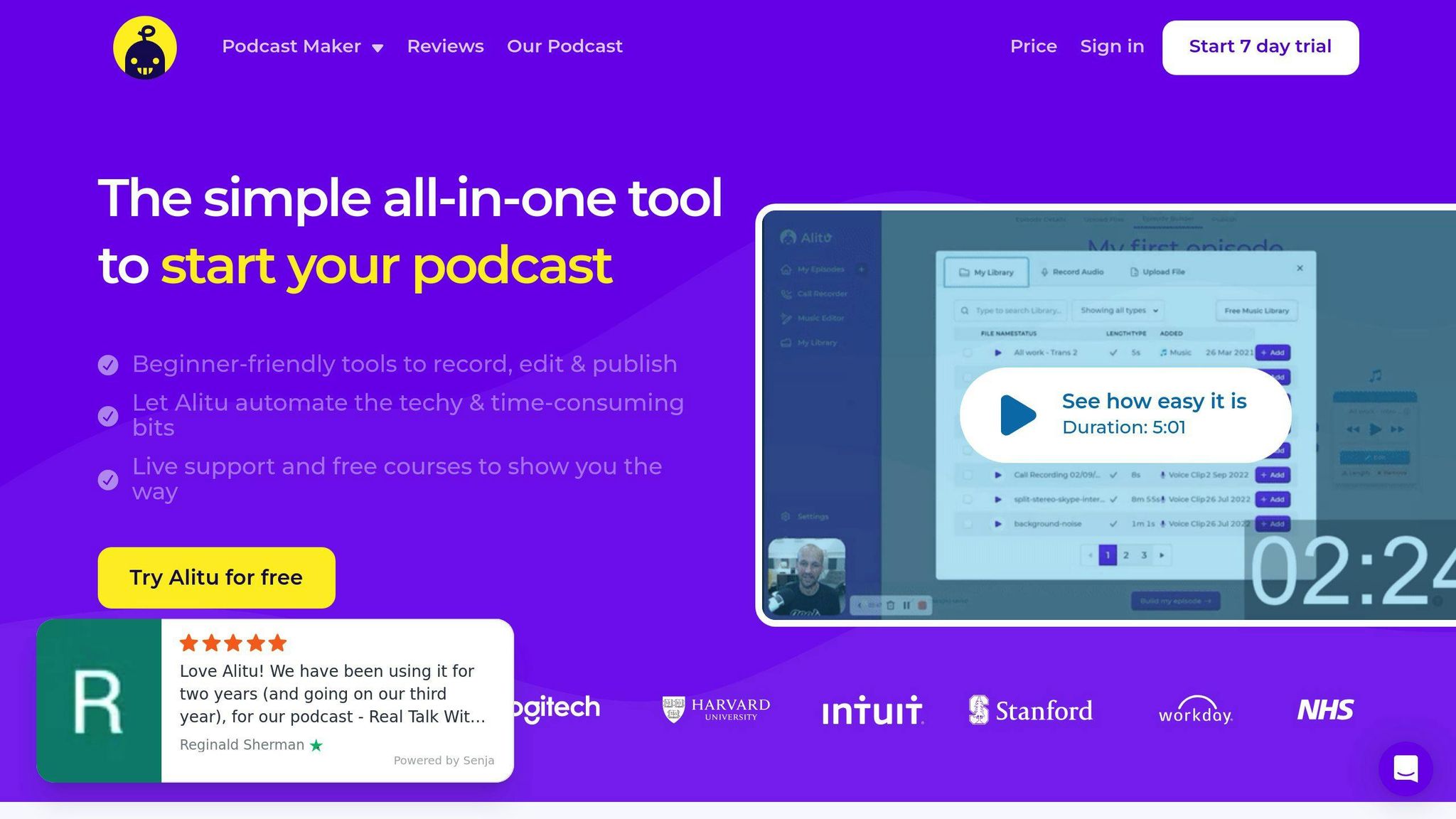
Alitu is a podcast editing tool that's all about making your life easier. Here's what you need to know:
Audio Editing Features
Alitu's got your back with:
- Automatic audio cleanup
- Noise reduction
- Volume leveling
- Filler word removal
But here's the kicker: Text-Based Editing. It's like editing a document, but for your audio. Super fast, super easy.
Production Capabilities
Alitu's not just an editor. It's a full-on production suite:
- Record calls with up to 10 people
- Solo recording option
- Upload pre-recorded stuff
- Auto-add music and transitions
- Free music library
- Publish directly to major hosts
Who's It For?
Alitu's perfect if you're:
- New to podcasting
- Flying solo
- Short on time
But if you need fancy multi-track editing or pro-level effects, you might want to look elsewhere.
Pricing
| Plan | Price | What You Get |
|---|---|---|
| Monthly | $28 | Everything |
| Yearly | $280 | Everything + 2 months free |
Both plans come with a 7-day free trial and free hosting (up to 1,000 downloads/month). Need more? It's $10 for up to 10,000 downloads.
"It used to take me 3 hours to do all this and now it's 30-45 minutes unless I'm being extra. Great value. This is a must-have for anyone who has a podcast and an actual life." - Dr. Monica Anderson, Host of Perpetual mOetion
Bottom line: If you want to spend less time fiddling with tech and more time creating, Alitu's your go-to.
9. Pro Tools
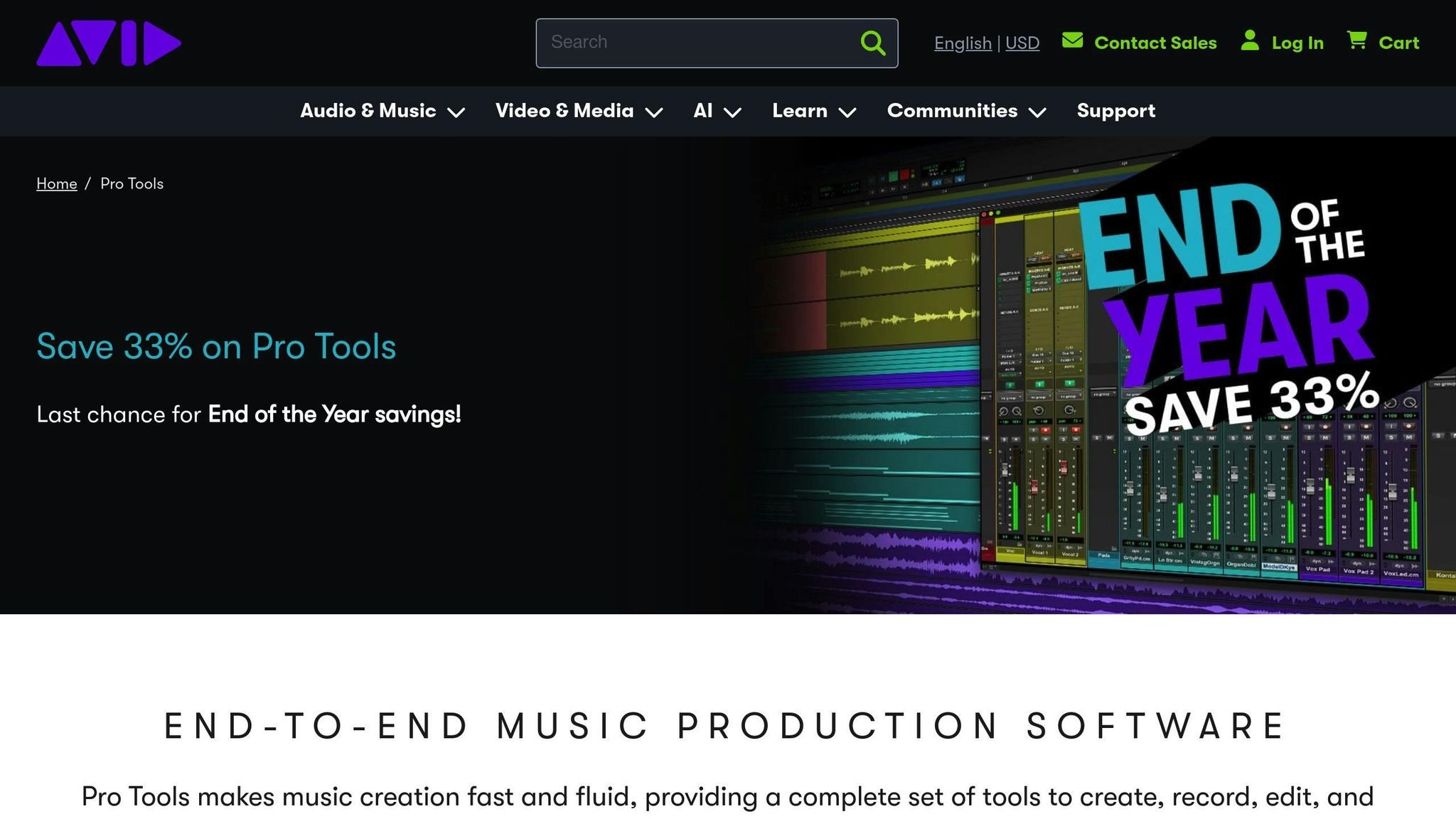
Pro Tools is a big deal in audio production. It's packed with features for podcast editing and production. Here's what makes it special:
Audio Editing Features
Pro Tools has some serious editing muscle:
- Record as many tracks as you want at once
- Edit without messing up your original files
- Add cool effects like distortion and echo
- Fill silent spots with natural background noise
- Keep your podcast volume steady automatically
Production Capabilities
But Pro Tools isn't just about editing. It's a production powerhouse:
- Export multiple files at once
- Work with lots of audio formats
- Add effects while recording and tweak later
- Group tracks to keep things organized
Who It's For
Pro Tools is great for:
- Pro podcasters who need advanced stuff
- Audio engineers working on complex projects
- People who don't mind a learning curve
It might be too much if you're:
- Just starting out in podcasting
- Only making small edits
- Mostly working with loop-based music
Pricing
Pro Tools comes in three flavors:
| Edition | Price | What You Get |
|---|---|---|
| Pro Tools First | Free | Basics for beginners |
| Pro Tools | $29.99/month | Full package for most users |
| Pro Tools Ultimate | $79.99/month | Advanced stuff for pros |
"Even with the 2022 Price Increase ($299/yr) - One billable hour more than covers my software expense." - Jim Lopardo, Owner, Sandbox Music Group
Pro Tools is top-notch for serious podcast production. It's got the tools pros love. But it's not for everyone - it's complex and can be pricey. Think about what you need and what you can spend before jumping in.
10. Podcast Launch Strategy
A solid launch strategy sets the stage for podcast success. It works for both newbies and pros, helping to build buzz and attract listeners.
New vs. Experienced Podcasters
New podcasters:
- Make 3-5 pilot episodes
- Get feedback from friends
- Tweak your content and format
- Focus on top-notch production
- Book strong guests
- Nail down your episode structure
Maximizing Your Launch
1. Pre-Launch (3 Weeks Out)
Create a landing page, share behind-the-scenes content, and build an email list.
2. Launch Week
Drop at least 3 episodes on day one. Prep social media content and release a trailer a few days before.
3. Post-Launch
Stick to a schedule, track downloads, and ask for listener feedback.
Pricing and Platforms
Many hosting platforms offer free plans to get you started:
| Platform | Free Plan | Paid Plan (Starting Price) |
|---|---|---|
| PodBean | 5 hours of audio | $9/month (unlimited) |
| Buzzsprout | 2 hours/month (90-day storage) | $12/month |
Key Editing Tasks
For your launch episodes, focus on:
- Cutting background noise
- Balancing volume
- Adding intro/outro music
- Inserting sponsor messages (if you have any)
"Launching with two or three episodes is best because you want to keep your audience in that momentum." - Fier, Podcast Expert
Tool Comparison
Let's break down some top podcasting tools to help you pick the right one:
| Tool | Key Features | Price | Best For |
|---|---|---|---|
| Adobe Audition | Pro editing, templates | $22.99/month | Serious editors |
| Audacity | Multi-track editing, noise reduction | Free | Budget-conscious |
| GarageBand | Virtual instruments, loops | Free (Mac only) | Apple fans |
| Descript | AI mixer, transcriptions | Free plan, $12/month | All-in-one users |
| Alitu | 'Magic Filters', easy interface | $38/month | Newbies |
| Auphonic | Auto leveling, noise reduction | Free up to 2hrs/month | Audio cleanup |
| Podcastle | AI mixer, video recording | Free plan, $11.99/month | Video podcasters |
Feature Breakdown
Adobe Audition is the pro's choice. It's edited over 5,000 podcast episodes. But heads up: it's not beginner-friendly.
Audacity is free but packs a punch. It's a favorite for podcasters who don't need fancy extras.
GarageBand is great for Mac users. It's pre-installed and user-friendly, with virtual instruments for creating your own podcast tunes.
Descript is making waves as an all-in-one tool. Its text-based editing is a game-changer for those who prefer working with transcripts.
Alitu is built for podcasters. Its 'Magic Filters' can cut filler words and silences automatically. Talk about a time-saver!
Pricing
On a tight budget? Audacity and GarageBand are free. If you're ready to spend:
- Adobe Audition comes with Creative Cloud. Worth it if you use other Adobe tools.
- Descript's $12/month plan balances features and cost.
- Alitu is pricier at $38/month, but its automated features could save you time.
User Experience
New to podcasting? Try GarageBand or Alitu. They're super user-friendly. Audacity is powerful but takes some getting used to.
For the pros who need precise control, Adobe Audition and Descript are your best bets.
Picking the Right Tools
Choosing podcasting tools doesn't have to be complicated. Here's what to consider:
Skill Level
New to podcasting? Go for user-friendly options. Alitu is a good example:
"Alitu offers drag-and-drop editing and automatic features, making it ideal for beginners." - Danny Brown, Host of One Minute Podcast Tips
Got some experience? Try Hindenburg Journalist Pro. For pros, Adobe Audition might be your best bet.
Format
Your podcast style matters:
- Interviews? Look for multi-track recording
- Solo shows? Basic editing tools might do
- Narrative-style? You'll need more advanced editing
Budget
Here's a quick look at prices:
| Software | Price | Free Trial |
|---|---|---|
| Audacity | Free | N/A |
| Alitu | $32/month | 7 days |
| Adobe Audition | $20.99/month | 7 days |
Test Drive
Most paid options have free trials. Use them! Find what works best for you.
Think Ahead
Pick software that can grow with you. Your needs might change as your podcast evolves.
Bottom line: The best tool is one you'll actually use. Don't get hung up on fancy features you don't need. Focus on what helps you create consistently and efficiently.
Wrap-up
Picking the right podcasting tools can make or break your show. Here's what you need to know:
1. Match tools to your skills
Start simple. Use Audacity or GarageBand if you're new. As you improve, try Adobe Audition or Pro Tools.
2. Focus on sound quality
Bad audio = lost listeners. Get a good mic and headphones. Use noise reduction in your software.
3. Be efficient
Speed up your work:
- Use keyboard shortcuts
- Make templates for intros and outros
- Stay ahead in production
4. Pick tools for your format
Different shows need different tools:
| Format | Key Features |
|---|---|
| Interviews | Multi-track recording, noise reduction |
| Solo shows | Basic editing, noise gate |
| Narrative | Advanced editing, sound design |
5. Have a plan
Set goals, make a content calendar, and stick to a schedule. It keeps listeners engaged and helps you manage your work.
6. Try new things
Test different tools. What works for others might not work for you. Use free trials before buying.
FAQs
What's the best software for editing podcasts?
It depends on your skill level and needs:
- Pro level: Adobe Audition, Reaper, Pro Tools
- Beginners: Alitu, Auphonic (AI-assisted)
- Free options: Audacity (Windows/Mac/Linux), GarageBand (Mac)
What app should I use to edit a podcast?
Pick based on your experience and budget:
| Level | Apps |
|---|---|
| Beginner | Alitu, Auphonic, Audacity, GarageBand |
| Intermediate | Adobe Audition, Reaper |
| Pro | Pro Tools, Adobe Audition |
What's the best editing software for podcasts?
The "best" varies:
- Want AI help? Try Alitu or Auphonic
- Need free options? Go for Audacity or GarageBand (Mac)
- Pro-level work? Adobe Audition, Reaper, or Pro Tools
"The best professional podcast editing software is Audition for Adobe users or Reaper and Pro Tools for any desktop." - Danny Brown, One Minute Podcast Tips
